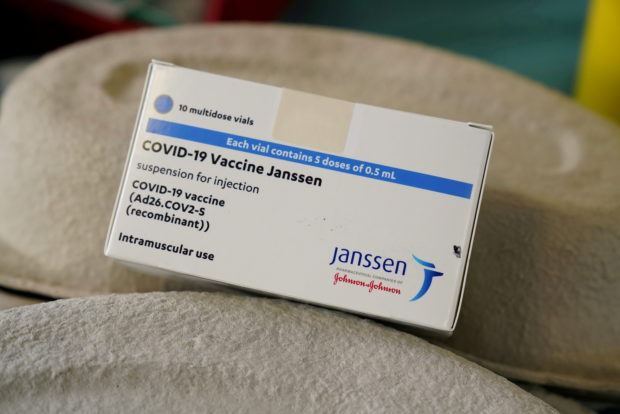US puts new warning on J&J coronavirus vaccine for autoimmune disorder

A box of Johnson & Johnson’s coronavirus disease (COVID-19) vaccines is seen at the Forem vaccination centre in Pamplona, Spain, April 22, 2021. REUTERS FILE PHOTO
The U.S. Food and Drug Administration on Monday added a warning to the fact sheet for Johnson & Johnson’s COVID-19 vaccine saying that data suggests there is an increased risk of a rare neurological disorder in the six weeks after inoculation.
In a letter to the company, the FDA classified the chances of getting Guillain-Barré syndrome (GBS) after vaccination as being “very low.” Still, it said J&J vaccine recipients should seek medical attention if they have symptoms including weakness or tingling sensations, difficulty walking or difficulty with facial movements.
Around 12.8 million people have received J&J’s one-dose vaccine in the United States. The FDA said 100 preliminary reports of GBS in the vaccine recipients include 95 serious cases that required hospitalization and one reported death.
J&J said in a statement that it was in discussion with regulators about the cases of GBS. It said the rate of reported cases of GBS in J&J vaccine recipients exceeds the background rate only by a small degree.
GBS is a rare neurological condition in which the body’s immune system attacks the protective coating on nerve fibers. Most cases follow a bacterial or viral infection. Most people fully recover from GBS.
The condition has been linked in the past to vaccinations – most notably to a vaccination campaign during a swine flu outbreak in the United States in 1976, and decades later to the vaccine used during the 2009 H1N1 flu pandemic.
According to a statement from the U.S. Centers for Disease Control and Prevention (CDC), most of the cases were in men, many of whom were 50 or older. It did not find higher than expected cases of GBS in recipients of the mRNA-based vaccines from Pfizer Inc/BioNTech SE and Moderna Inc.
Last week, European regulators recommended a similar warning for AstraZeneca’s COVID-19 shot, which is based on a similar technology as Johnson & Johnson’s vaccine.
The warning is another setback for the J&J shot, which was supposed to be an important tool for vaccinating in hard-to-reach areas and among those hesitant to be vaccinated because it requires only one shot and has less stringent storage requirements than the Pfizer or Moderna vaccines.
But use of the vaccine has already been linked to a very rare, potentially life threatening blood clotting condition and slowed by production problems at the main plant where it is being made.
U.S. regulators decided in April that the vaccine’s benefits outweighed the risk from the blood clotting issue.
The warning was first reported by the Washington Post on Monday.